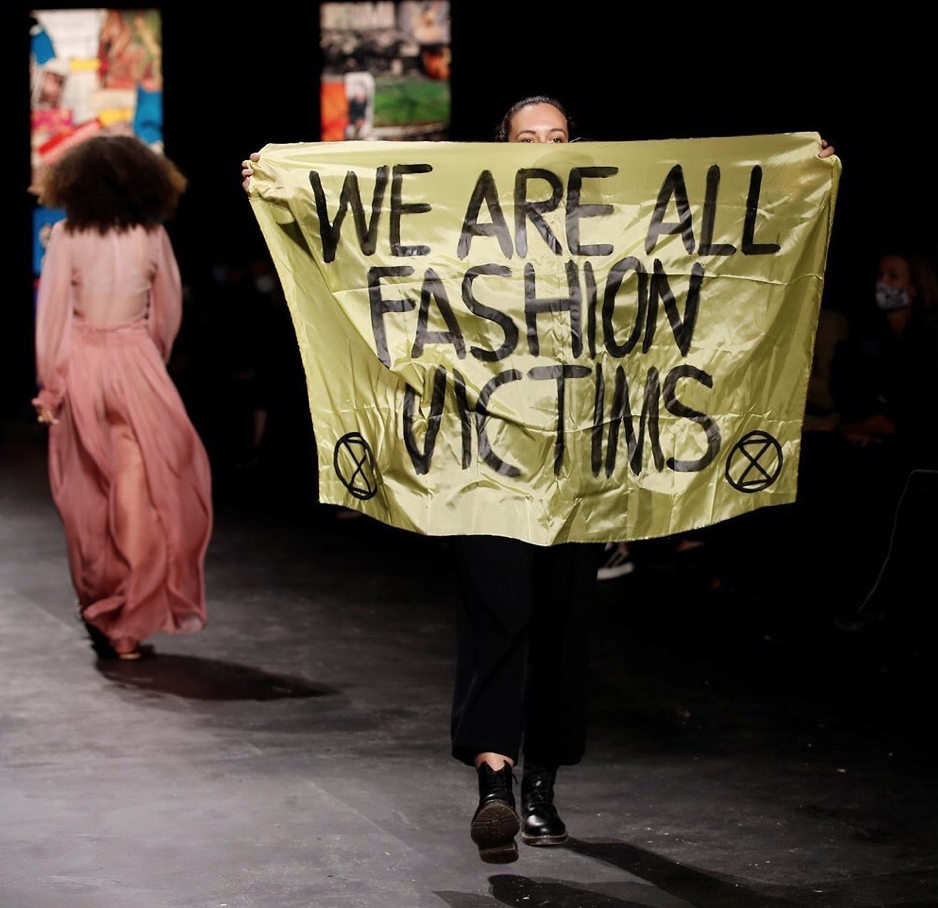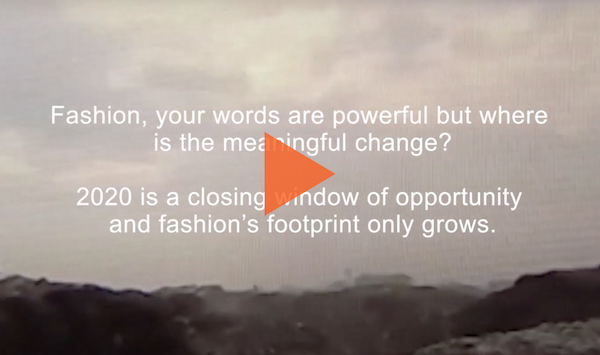Meet ‘Fashion Act Now’
From the G7 Fashion Pact to the UN Alliance for Sustainable Fashion, from collections crafted from plastic bottles to elaborate carbon offsetting schemes, it feels as though fashion is finally taking sustainability seriously. Look deeper, however, and the figures say something different. According to the 2017 Global Fashion Agenda Pulse Report, fashion consumption is predicted to grow by 63% over the next decade – completely outweighing any efforts to make the industry ‘sustainable’. This year, the news just got worse: if the fashion industry continues on its current path, it will miss the 2030 emissions reduction targets by 50%.
During lockdown, we at Extinction Rebellion Fashion Action spent a lot of time thinking about this cognitive dissonance: why, on the one hand, the industry seems fully aware of the climate emergency, while, on the other, is unable to take the concrete action needed to address it. And we know that fashion is on our side. During Paris Fashion Week, we released an open letter, in video form, that said the industry’s own words of radical change back to it. The quotes by leading figures including Marc Jacobs, BFC CEO Caroline Rush, Virgil Abloh, Artistic Director of Louis Vuitton’s Menswear, Olivier Rousteing, Creative Director of Balmain, all taken during Covid-19 lockdown restrictions, were read out by Tori Tsui, intersectional climate activist, educator and mental health advocate.
Directed by Tessa Edwards and Kailash Bharti, the two-minute montage overlaid images of conspicuous consumption and waste over footage of woodland recovering from a forest fire. The juxtaposition referenced both fashion’s impact on the natural world as well as the possibilities of new hope and regrowth. The letter speaks to an industry at a crossroad: do we carry on the destructive path that we are on or do we reimagine fashion as a regenerative system that puts the planet first?
We are in an emergency. Even if countries meet commitments made under the 2015 Paris Agreement, the world is heading for a 3.2 degrees celsius global temperature rise over pre-industrial levels, says the UN Environment Programme. The effects could be catastrophic – for all life. As the UNEP put it via social media: “We’re on perilous ground. Over 3°C would bring mass extinctions & large parts of the planet would be uninhabitable. We need to supercharge our #ClimateAction ambition NOW.”
Fashion remains one of the biggest drivers of this destruction. It is one of the world’s most polluting, wasteful industries, churning out 100 billion items of clothing a year, most of them made from virgin resources, of which less than 1% is recycled into new. Carbon emissions from fashion contributes up to 10% of the world’s total. And none of this will truly change until we address the spectres in the room: conspicuous consumption, exponential growth, adherence to goals of financial profit over all else. Almost every commitment to sustainability is wedded to these – and that is why they will never succeed at the rate we need them to.
Till now. Our Letter to Fashion was the launchpad for our latest campaign, Fashion Act Now, which will call for the industry to work faster in its role to mitigate climate and ecological breakdown. We want to help leapfrog the corporate stranglehold of traditional sponsorship to create, instead, a people-powered solution to break the deadlock. Change is happening – Gucci has made moves towards seasonless fashion; Saint Laurent is also following its own calendar; Dries Van Noten has led a group of brands and retailers that call for a reformatting of the fashion system. We want to turbo charge it, in line with the science.
 We’ve done it before. Through its Boycott Fashion campaign, Extinction Rebellion Fashion Action challenges the culture of mass consumption; we are leading an ongoing call for the cancellation of the Fashion Week format and its culture of newness and excess, neither of which has a place in the environmental emergency. Through non violent direct actions, open letters and social media interventions, we have kickstarted difficult conversations around cultural transformation and systemic change.
We’ve done it before. Through its Boycott Fashion campaign, Extinction Rebellion Fashion Action challenges the culture of mass consumption; we are leading an ongoing call for the cancellation of the Fashion Week format and its culture of newness and excess, neither of which has a place in the environmental emergency. Through non violent direct actions, open letters and social media interventions, we have kickstarted difficult conversations around cultural transformation and systemic change.
We want to co-create a roadmap for a real crisis response from the fashion industry by bringing campaign groups such as Fashion Revolution – which has already done so much work in this area, activists, economists, scientists, policy makers, industry insiders and garment workers. Together, we can map out the best ways to challenge the economic systems and business models which depend on competition and growth, at the expense of people and planet. We will ask for a consensus on the tough questions: how fast does the industry need to downsize resource use in order to play its part in keeping global warming to below 1.5°C? What does that look like for ordinary people? And how can this be done in a way that centres the most vulnerable?
From a series of consultations with experts, key findings will be processed into action plans for industry-shifting change before being presented in a global online summit. Audiences will be presented with the irrefutable science of targets and planetary boundaries. Governments will be pressured to pass legislation to halt exploitive practices and pollution in fashion so that the true environmental and social costs can’t be ignored. The voices and needs of garment and supply chain workers will be prioritised. A code of conduct will be developed and industry partners invited to sign up. Our greatest asset – our global network of citizen activists – will be galvanised to hold brands accountable to their pledges.
Finally, guided by the work of Kate Fletcher and Mathilda Tham of Earth Logic Fashion Action Research Plan, we will offer a vision of a future for fashion that embeds equity, resilience, care for the planet and its inhabitants at its core. Fashion Act Now is supported by a cohort of pioneers in the debate around change in fashion including Remake; Clare Press; Global Fashion Exchange; Lucy Siegle, journalist; The Sustainable Angle; Tamsin Lejeune, CEO and founder of Common Objective; Dilys Williams FRSA, Director of Centre for Sustainable Fashion, a University of the Arts Research Centre; Traid; and The Sustainable Angle and Safia Minney MBE FRSA, Founder of REAL Sustainability.
We have great hopes for this project to be the collaborative, culture-transforming vehicle that it needs to be but it needs all voices, all drivers, all change-makers to fulfill its potential. We look forward to making this happen.
Learn more and keep up to date by following @Fashion_Act_Now and visiting us here.









